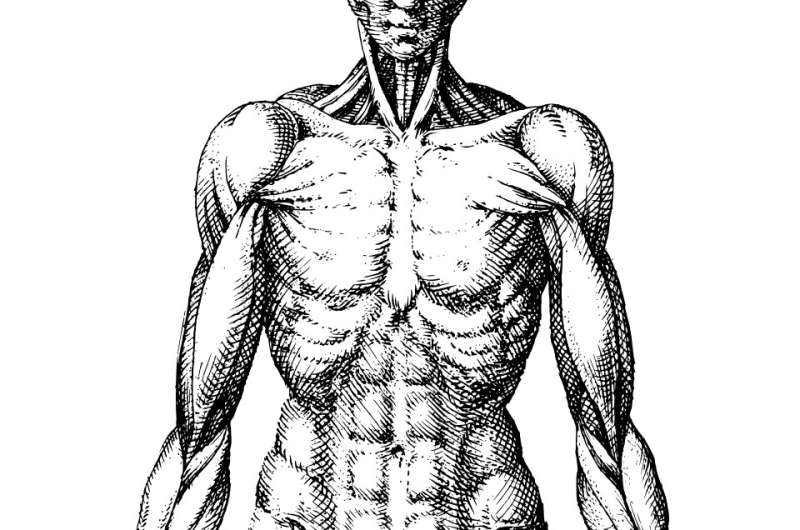This article has been reviewed according to Science X's editorial process and policies. Editors have highlighted the following attributes while ensuring the content's credibility:
fact-checked
peer-reviewed publication
proofread
Getting around muscle aging by modulating the function of immune cells

Muscle is able to regenerate through a process that involves multiple steps and players, including the immune system. As our organism ages, the muscles lose the capacity to regenerate.
Now, a new study led by Joana Neves and Pedro Sousa-Victor, group leaders at the Instituto de Medicina Molecular João Lobo Antunes (iMM,Portugal), and published in the journal Nature Aging, shows that it is possible to modulate the function of the immune cells to recover the ability to regenerate muscle in aged mice.
The researchers found a protein that regulates the function of a subset of immune cells, macrophages, by promoting their ability to clear residues in the regenerating muscle.
"We found that the behavior of macrophages is altered in aged mice. Macrophages are a type of immune cell that are capable of phagocytosis, the process of ingestion and elimination of particles inside cells," says Joana Neves, group leader at iMM and co-leader of the study.
"During regeneration the macrophages are responsible for clearing the dead cells from the muscle after injury, which is a normal step of the process of muscle regeneration. Macrophages act like a cellular vacuum cleaner, cleaning the 'dirt' from the muscle," adds Joana Neves.
The researchers found that macrophages in aged mice have reduced levels of a protein, called MANF, that is crucial for this process. "In fact, this protein is so important in this process that if we decrease MANF levels in the macrophages in younger mice, their ability to regenerate muscle is also impaired," adds Neuza Sousa, student at iMM and first author of the study. "On the other hand, increasing the levels of the protein MANF in aged muscle is sufficient to recover muscle's regenerative capacity," continues Neuza Sousa.
On the implications of the study for regenerative medicine and aging, Pedro Sousa-Victor, co-leader of the study and also a group leader at iMM, says, "A central promise of regenerative medicine is the ability to repair aged or diseased organs using stem cells. This approach will likely become an effective strategy for organ rejuvenation, holding the potential to increase human health span by delaying age-related diseases. Our study shows that immune aging is an important obstacle to the regenerative capacity of aged muscle."
The clinical success of the current stem-cell based therapies is limited by the capacity of aged and diseased organs to regenerate. In this study, the researchers discovered an immune modulator that can be used to improve the function of the immune system in the aged muscle. "We believe that MANF could be used in the future as a supplement to improve the efficiency of current muscle regenerative therapies," concludes Pedro Sousa-Victor.
These findings could be used in the future to promote the reparative function of the immune system and improve the success the current stem-cell based therapies for muscle regeneration.
More information: Joana Neves, Aging disrupts MANF-mediated immune modulation during skeletal muscle regeneration, Nature Aging (2023). DOI: 10.1038/s43587-023-00382-5. www.nature.com/articles/s43587-023-00382-5



















